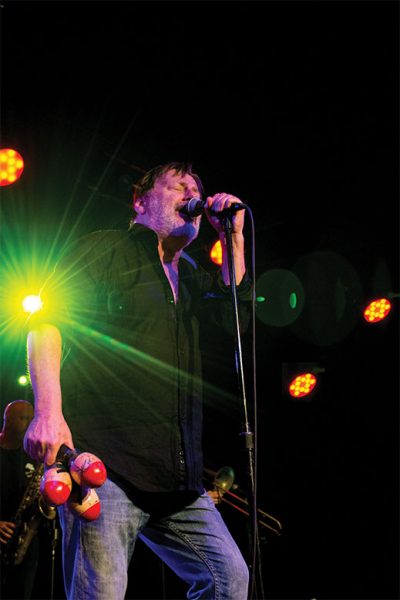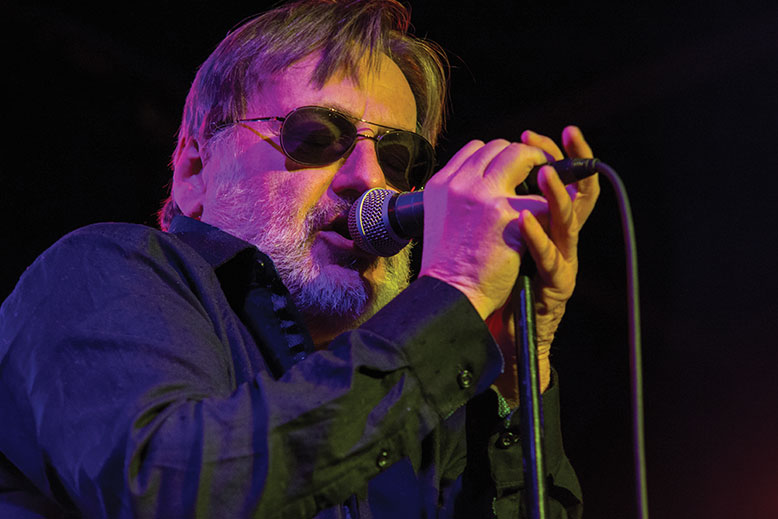
A few years ago, Southside Johnny was in the liquor store next to the Neptune Stop & Shop when Curtis Mayfield’s classic hit “Superfly” came over the loudspeakers.
“Everybody started grooving,” says Southside, whose real name is John Lyon. Inspiration struck. “I decided I wanted to make a retro-sounding soul record, but with a newer sensibility to it.” The result was 2015’s Soultime!, the rocker’s most recent studio album with his longtime band, the Asbury Jukes.
That album, now in rock ’n’ roll’s rearview, racked up exuberant reviews on amazon.com and around the Asbury Park boardwalk, where the band’s bluesy heartbeat still thumps loudest. But if its release is news to you, that’s okay by Southside. In fact, even if everything he’s recorded since he first started cutting albums in 1976 has escaped your notice, he can handle that. But tell him his live show doesn’t strike a chord, and that would hurt.
“When you’re playing a show, all the old clichés apply,” says the singer-songwriter. “If you don’t kick ass that night, you’re going to lose some people in the audience. And then you’re going to have to work harder next time.” If you’ve been around the music scene awhile, as he has—Southside started playing straight out of Neptune High, and he graduated back in 1967—you learn fast not to disappoint the faithful. “You can’t just go out there and mess around. You’ve got to really play,” he says. “It’s just like any other thing: If you’re in the Olympics and you say, ‘I don’t feel like running today, so I’m just going to jog,’ you’re not going to be in the Olympics very long.”
Southside’s Olympic spirit will be on full display in Asbury Park at the band’s annual Fourth of July show at the Stone Pony Summer Stage. Naturally, the set list will include “The Star-Spangled Banner”—an annual sing-along with the hometown crowd. “It’s great for all of us to have something to sing together besides ‘We’re Having a Party,’” says Southside, referring to the Sam Cooke tune that might be the band’s best-known song. (“I Don’t Want to Go Home” is another contender.) He doesn’t remember how many years he and the Jukes—currently, guitarist Glenn Alexander, trumpeter Chris Anderson, bassist John Conte, sax man John Isley, organist/pianist Jeff Kazee, trombonist Neal Pawley and drummer Tom Seguso—have kept up the July tradition. But that is not his job. “My job is to try and remember the lyrics and to not fall offstage,” he quips. “That’s about all I can handle.”
He is kidding—though, as he nears his 70th birthday in December, Southside is taking nothing for granted.
Southside Johnny was born in 1948 in Neptune and grew up in Ocean Grove, where he still lives by himself. He avoids talk about his personal life, calling it complicated. “Let’s not get into it,” he says. “I have no kids, no pets and no friends. I like to be left alone in my little hovel.” The hovel is actually a cottage four blocks from the beach, where he moved less than a decade ago, when the lack of a septic system in a house he bought in the wetlands of Delaware finally drove him out. “It was great, it was right on the bay, and birds would come and you’d see horseshoe crabs.”
Unfortunately, conservation concerns wouldn’t allow for a septic system. For a bathroom, Southside drove to the local ShopRite.
A friend—yes, he has friends, as comrades Bruce Springsteen and Jon Bon Jovi might attest—offered him the Ocean Grove cottage. It’s been a happy return.
Southside’s father worked at a local post office here and his mother at the phone company. They weren’t boring. The night his mother went into labor with him in 1948, she and his father were at a club listening to loud music. “My mother was mad that she had to leave,” he says. His parents, both deceased, were “delightful people,” he adds. “They read Shakespeare and James Joyce and listened to music all the time.” Billie Holiday was a favorite. “My mother and I would watch plays together. It was a great childhood in what felt like one of the safest towns in the world.”
The fun and games of Asbury Park were an early draw. He and one of his brothers—he had three siblings—would squirrel away quarters they were supposed to drop in the Sunday school collection plate and feed them to pinball machines on the boardwalk. At Neptune High, his classmates included Garry Tallent and Vini Lopez, both future members of Springsteen’s E Street Band. Shortly after high school, Southside co-founded the Asbury Jukes with Steven Van Zandt, who had been a member of Steel Mill, an early Springsteen band.
The name Southside materialized when Springsteen insisted everyone in one of his early bands, Doctor Zoom and the Sonic Boom, take on a nickname. Southside’s preferred style of music was Chicago blues, but he didn’t want to be Chicago Johnny. So somebody—he can’t remember who—floated the name Southside for the South Side of Chicago, capital of the blues in that city. It stuck.
Southside remembers the early ’70s, when the Shore rock scene was taking off, as almost criminally fun. “We were a bunch of lucky bastards. And we were aware of it back then, too. We weren’t making any money but weren’t under any pressure. We were having the time of our lives getting away with murder.”
Ambition was evident early in at least a few local bandleaders, Springsteen especially. But fame and fortune were never Southside’s thing.
“I don’t like to be the focus of attention,” he says. “My old manager used to say I was the anti-rock star.” He doesn’t mind being approached by strangers and informed that they saw him play somewhere in 1987. But “usually I’ve got my head in the clouds, and I don’t like to be interrupted.” Southside says fans who might catch him strolling the boardwalk, head down, are mostly respectful of his privacy because he often appears to be in his own world, bumping into things. Springsteen is also often left alone when out in public, he says, but for a different reason.
“Bruce has got that aura about him where people might follow him, but very few will come up to him. Unless they’re loony or drunk, they won’t harass him. He has that barrier around him. I always thought that was a great aura to give off.”
Bon Jovi, whose home studio Southside sometimes borrows to record in, has his own fan-control tactics. “He’ll stop for people, but he knows how to shut them down pretty quickly. Steven [Van Zandt] is good at that too,” he says.
Unlike his more famous buddies, Southside has never unbuckled himself from the roller coaster ride that is Asbury Park’s history. Right now, he hears the click-click of a climb to the next peak. Whether stomachs will lurch from some spectacular drop in years to come, he can’t be sure.

Photo courtesy of Nancy Nutile-McMenemy
“We’re now going into better times, with a lot of new restaurants and clubs,” he says. “But you always go around with the feeling the whole thing could collapse, because you never know what’s going on under the surface with the politicians and the developers. There’s an undertow of nefariousness in Asbury Park. You’re always waiting for the next building to collapse.”
Their former stomping grounds may be somewhat dicey, but fans know the legends who put the city on the rock ’n’ roll map are souls you can depend on. Like his philanthropic brother, Springsteen, and other Jersey Shore-bred artists, Southside is a giver to causes, especially Light of Day, a New Jersey charity that helps fund Parkinson’s research and holds a massive, 10-day fundraising festival each January in Asbury Park. Southside, like Springsteen, occasionally joins the lineup; in April, Southside & the Jukes headlined a Light of Day tour in Canada. He’s also done shows to benefit the Monmouth FoodBank and Jersey Shore restaurateur Tim McLoone’s charity, Holiday Express.
The impulse to give back, he says, is what happens when you feel gratitude that you don’t have to dig ditches for a living. But Bobby Bandiera, another Jersey Shore rock luminary and a former lead guitarist for both the Jukes and Bon Jovi, says that for Southside, it’s more than that.
“Southside Johnny is not only one of the best singers I’ve ever heard and a guy you want to be onstage with,” he says. “He loves what he does, he loves people, and he loves who he plays in front of. He’s one of the best guys I’ve ever known in the world. He’s got one of the hugest hearts out there.”




Great article. Southside Johnny and the Asbury Jukes are awesome.
Southside Johnny and the Asbury Jukes put on such a terrific live show … they are just super, and they have lots of repeat long-term regulars at their concerts. You are always gonna have a great time. Love the band, love the horns, all the musicians are superior, and there is just something so perfect and sort of bluesy about the sound of Johnny’s voice on certain songs… It’s a great show…see it if you haven’t already.
Southside Johnny and the Jukes are living legends and KIngs of New Jersey Soul-Rock! Thank you for all the years of great music, guys, and for keeping it real.